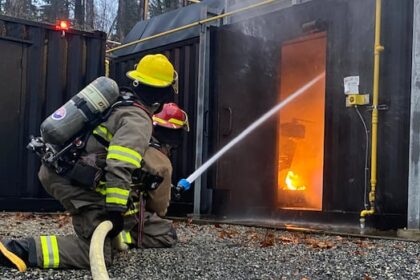The recently elected youth grand chief for the Cree Nation of Eeyou Istchee in Quebec says the most important thing she could do during the campaign was ask young people what they needed. In an interview with APTN News, Jade Mukash said she put her own concerns second and placed the needs of youth voters first. “I didn’t start my campaign with an action plan or my own issues that I felt were happening across Eeyou Istchee,” she said. “I really went into it with a blank slate.” With her husband managing her campaign and their young son in a car seat, Mukash, 26, visited all of Eeyou Istchee’s nine communities spread out from the east coast of James Bay to those southeast near Chibougamau. “I met with the youth councils and different leaderships in the communities,” she said, “and I spoke to them about what it’s like to live in their community, what it’s like to be a youth in their community.” Mukash was elected in August, nearly 40 years to the day from the original 1985 Cree Youth Conference, which established the need for an Eeyou Istchee youth council to serve the needs of Crees under the age of 35. The youth grand chief and deputy grand chief (a position won by Darius Neacappo-Pelchat from the Cree Nation of Chisasibi) said they aim to ensure the Cree Nation Government is aware of the specific needs of a population that has skewed younger for many years. According to the Cree Nation Youth Council website, the organization and its leadership serve youth by identifying concerns specific to younger members and developing programs and projects that meet younger people’s needs. Many across the Cree Nation already know Mukash, who was elected Miss Eeyou Eenou Iskwaau in 2024 after previously being Miss Whapmagoostui in her home community, where she was also elected to the local youth council. Those who don’t know Mukash from those roles likely know her name. She’s the granddaughter of Matthew Mukash, the former Cree grand chief elected in 2005. “There’s a very certain way that you carry yourself within your community and within your nation when your grandfather is the grand chief of the Eeyou Istchee,” Mukash said. “Even now, I see him carrying himself with a lot of humility and love for his people and the land.” That combination of experience and generations of family knowledge translated to an effective campaign, which Mukash focused on bringing politics to youthful events rather than trying to attract youths to political rallies. “I think when people think campaign, they think of speeches and pamphlets and that stuff,” Mukash said. “But we went for a more youthful approach. We had volleyball nights, we had game nights with the youth. “And I feel like those spaces really made the youth feel like they were able to open up and speak about what it’s like to be a youth in their community.” Read more: Born into a treaty and raised on resistance: Cree Youth mark 50 Years of the James Bay Treaty at the UN Cree community of Mistissini teaching traditional skills to protect culture Joshua Iserhoff was youth grand chief from 2012 to 2015. He noted that the position of Cree youth grand chief was created out of a reflection for the enormous population of people between the ages of 13 and 35 in the Cree Nation. “Even back in the day,” Iserhoff recalled of the 1990s, “more than 60 per cent were [in the ‘youth’ age bracket.] And that hasn’t changed. I remember when I was the youth grand chief, about 65 per cent of the entire Cree population was below 35.” The isolation of the Cree Nations has always been a major driver for youth leadership, Iserhoff stressed. “We don’t get all the programs,” he said. “We don’t get all the different types of resources that the South has. [So,] from the ’90s to 2000s, when I came in, it was always said that we will be the catalyst of change and the catalyst of the leading youth organization around the world.” For Mukash, the path to leadership began with hearing the concerns of all nine communities of the Eeyou Istchee. “It definitely was a challenge, but it was completely worth it,” she said. “Even the communities that were right next to each other, like a two-hour drive away, [they were] completely different, [with] completely different experiences, completely different issues and challenges. So it was very interesting: I really got to know each youth council and the leadership in the communities and I really got to spend time with the youth.” Logo of the Cree Nation Youth Council. Photo: CNYC, Facebook Mukash said she’s passionate about language revitalization, especially because she was raised partly in the south, partly in her home community of Whapmagoostui, Eeyou Istchee’s only fly-in Nation. Because she split her time growing up, she also split her language learning, leaving her less fluent than she’d like to be. “As a youth growing up part-time in the city and then part-time in my community, my experience was very different from those living in the communities their whole lives,” she recalled. Mukash said she’s impressed with the variety of approaches the Cree School Board and Cree Language Commission have taken toward strengthening the Cree language. “I believe that working together with them as the Cree Nation Youth Council can definitely help,” she said, “because we have that different perspective as the learners rather than the teachers.” Mukash has four years to make her mark on Cree youth politics. “When I was on my campaign,” Mukash said, “the number one thing that I heard from the youth was that they didn’t want any more broken promises from their leadership.” She said she hopes to meet the needs of young people by supporting youth centres and different youth programming across the Cree communities. As a separate organization with its own budget, the Cree Nation Youth Council has the capacity to meet youth needs specifically, and Mukash hopes to optimize that process. At the same time, she’s interested in using the Youth Council as an incubator for political ideas. She said she relishes events like the Treaty Simulation, in which varieties of different groups work together to role-play the process of signing a document like the James Bay Northern Quebec Agreement, or the Paix des Braves, two treaties that have shaped the modern Cree Nation. “Our goal is to create bridges with other organizations,” Mukesh said, “such as the Cree Health Board, the Cree School Board, the Justice Department in Eeyou Istchee, and really strengthen those bridges so that we can look at our issues in all different perspectives and work together to make sure that we’re not overlapping.” After all, she noted, what happens in the Cree Nation Youth Council tends to get carried on to formal Cree leadership. “If you look at the Cree Nation Youth Council today, we’re very much a training ground for future leaders and politicians,” she said. Continue Reading
Eeyou youth grand chief hopes to give youthful Cree Nation what it needs

Leave a Comment










